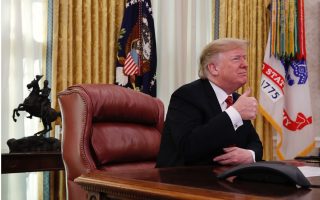This is not your father’s America

WASHINGTON, DC – The first US-Greece Strategic Dialogue this month highlighted the steadily improving bilateral relations between Washington, DC, and Athens. There have been so many high-level visits and so much diplomatic, commercial and military activity between the two countries that the constant refrain of “this is the best point in the relationship since the Truman administration” has become believable. Is the comparison to that previous high point fair?
On at least two fronts, the comparison to the Truman years is inappropriate. In 2002, the Hellenic Ministry of Foreign Affairs published “Documentary History of Greece [1943-1951].” The subtitle of the book – “Truman Doctrine and Marshall Plan” – warrants special notice. There is certainly nothing like the latter on the table when it comes to US-Greece relations, and to expect there to be a new Marshall Plan would require one to be particularly unrealistic.
During a time of budgetary constraints for the United States, there are already too many calls for a new Marshall Plan for various regions. Greece’s membership in the European Union and its relative wealth (ranked in the top 50 in both gross domestic product per capita and purchasing power parity per capita) means that even if a Marshall Plan was feasible, Greece probably wouldn’t be designated as a beneficiary.
Despite the present uptick in relations, the US failed to include Greece in the Better Utilization of Investments Leading to Development (BUILD) Act – although the act was meant to counter China’s Belt and Road Initiative, which has already been extended into Greece with the purchase of the Port of Piraeus. Trade relations and American foreign direct investment in Greece will have to increase substantially for there to be an even passable comparison to the Truman era on the economic front.
As Athens starts developing expectations for this improved bilateral relationship, the absence of anything resembling the Truman Doctrine should be of greater concern. Greece was central to President Harry S. Truman’s early Cold War strategy. While today’s Greece appears to be similarly prioritized by Assistant Secretary of State for European and Eurasian Affairs Wess Mitchell (and by extension Secretary of State Mike Pompeo) and US Ambassador in Athens Geoffrey Pyatt, one can only speculate as to where the country fits into President Donald Trump’s worldview.
Given Secretary of Defense James Mattis’s resignation last week, it also wouldn’t be out of line to question whether the president is fully on board with the policies that his foreign policy professionals are pursuing.
In the Foreign Affairs essay “Trump Versus the Government” written before Mattis’s resignation, Elliott Abrams – a veteran of the Reagan and George W. Bush administrations who the White House rejected as deputy secretary of state because he was critical of candidate Trump during the 2016 elections – argues that “the distinction between the president and the government… has become one of the administration’s defining characteristics.”
Abrams observes that the “gap” between President Trump and senior officials in his administration “appears to be the result of an effort by some within the government, and even in Trump’s own cabinet, to blunt his initiatives, carrying on business as usual in direct opposition to the wishes of the president.”
What does this mean for Greece? While the bilateral relationship is certainly on the upswing, it still finds itself at a stage where who is sitting around the table matters. Defense Minister Panos Kammenos put in great effort to cultivate relationships with former chief of staff Reince Priebus and secretary Mattis. Both are gone. Former foreign minister Nikos Kotzias saw almost no return from early efforts with President Trump’s first two national security advisers, Michael Flynn and H.R. McMaster – neither of whom made it anywhere near the midterm elections.
Both Greece’s ambassador to the United States (Haris Lalacos) and the United States ambassador to Greece (Pyatt) are in their last year in their respective posts, and they will both be tough acts to follow. There has been a great deal of contact with Commerce Secretary Wilbur Ross, but he was recently left out of the G20 and is rumored to be part of an exodus from the administration in early 2019.
Finally, while multiple Greek political figures have had their photos taken with George Papadopoulos and have been mentioned in his interviews or in reports detailing the investigation into his activities, how many can claim to have had even a single phone call with all of the following: the chairs of the Congressional Hellenic Caucus (Gus Bilirakis and Carolyn Maloney), the chairs of the Congressional Hellenic-Israel Alliance caucus (Gus Bilirakis and Ted Deutch), the top Philhellene in the US Senate, who also happens to be the ranking Democrat on the Senate Foreign Relations Committee (Robert Menendez), the two senators who helped increase military education and training funding for Greece (Lindsey Graham and Chris Van Hollen), and the Greek Americans in Congress (in addition to Bilirakis, John Sarbanes, Dina Titus, Charlie Crist and the incoming Chris Pappas)?
I could identify several other members of Congress who would warrant direct contact from the highest level of Greek leadership, but the answer to who has had contact with this modest list is zero.
American foreign policy is more unpredictable than ever before, and Greece needs to do some contingency planning. The Greek government must do its utmost to find ways to institutionalize this improved relationship.
It should also immediately rectify the mistake of leaving the position of deputy chief of mission position at the Greek Embassy in Washington vacant for eight months. Moreover, both the government and the opposition can do better at cultivating relations with Congress. But if there is no course correction, the volatility in American foreign policy may one day leave Greeks as disappointed as Syria’s Kurds.
Endy Zemenides is executive director of the Hellenic American Leadership Council.





